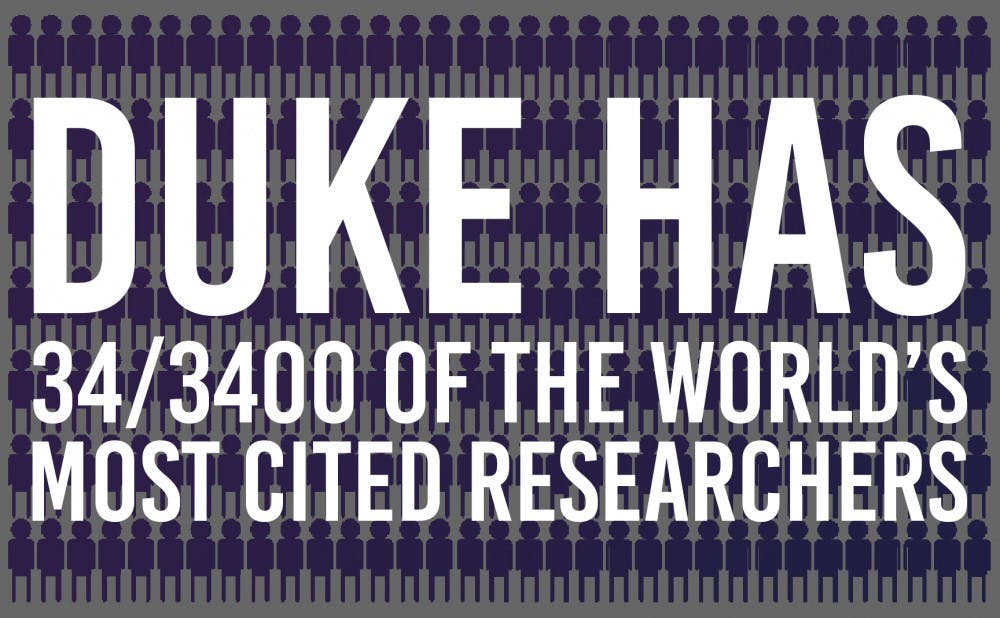Duke researchers make up one percent of the top one percent of researchers in their respective fields, according to a report released by Clarivate Analytics.
Of the 3,300 researchers listed as the most influential scientists in the world, 34 came from Duke, distinguishing themselves in the fields of clinical medicine, economics and business, environment and ecology, immunology, mathematics, microbiology, physics, psychiatry and psychology among other subject. Another 13 scientists came from the Duke-NUS Medical School in Singapore.
Clarivate Analytics assembled the list based on which researchers were the most highly cited by peers in the field over an 11-year period.
“The listing means that we have many faculty members who are publishing at the very highest level of their field,” said Lawrence Carin, vice provost for research and chair of the electrical and computer engineering department.
Carin highlighted Duke’s efforts to accommodate researchers with productive working environments. He also emphasized the highly-interdepartmental research model and the collaborative research environment it creates for Duke’s scientists.
“We continually strive to better the environment for our researchers, which often means new buildings and facilities and working to make Duke a really attractive place to be engaged in research,” Carin said.
James Berger, professor of statistics and the only mathematician from Duke recognized by Clarivate Analytics, echoed Carin’s thoughts.
“I think that Duke is an extremely collaborative university,” he said. “Everybody in my department has extensive collaborations outside of the department. Collaborative works tend to be more widely read and cited within a discipline.”
Terrie Moffitt, Nannerl O. Keohane University professor in the Center for Cognitive Neuroscience, added that she has benefited from working with faculty who share the same interests as her.
Moffitt was among the most prominent researchers listed in psychiatry and psychology. Her research involves studying different measures of child maltreatment and their effects on an individual’s mental and physical health throughout their development.
“My research participants live in New Zealand and England, so why do I work here you may ask,” Moffitt said. “One reason is because Duke is a magnet for really smart students, and I need students to help me with this research.”
Moffitt conducts her research using a longitudinal burst cohort study model, a form of observational study in which all the people born in one place during a given year are studied. She noted that this model of studying her subjects has allowed her to distinguish herself in the field.
“The reason that this is so useful is that if you want to prove that stress causes health problems, you would have to do an experiment, but with human subjects, we are not ethically allowed to stress participants out," she said. “I think that people turn to studies like mine because they offer the naturalistic observation of tracing a person through time.”
Although her research methods often take longer and cost more than other forms of observational study, they have afforded her study credibility in the field.
Carin noted that Duke’s collaborative research environment extends to its students.
“Research is very accessible at Duke to our students, and we really encourage our students to get involved in research and many of them do,” Carin said. “The research experience is one that many students at Duke want to get involved in as possible."
Beyond the breadth of research going on, Carin emphasized the ease of collaboration between the University’s main campus and the medical school.
“The other thing that is important is that the medical center is right next to the main campus,” Carin said. “In other universities, the health system is separate from the campus, and so that also is a significant strategic advantage for Duke.”
“I recognize a lot of those people who were mentioned on the list, but I would point out that there are many factors that go into being highly cited, including working in a big field,” Carin said. “While we are really proud of those people on the list, we have fabulous faculty at Duke who are at the very top of their field who do not appear on lists like that.”
Get The Chronicle straight to your inbox
Sign up for our weekly newsletter. Cancel at any time.

